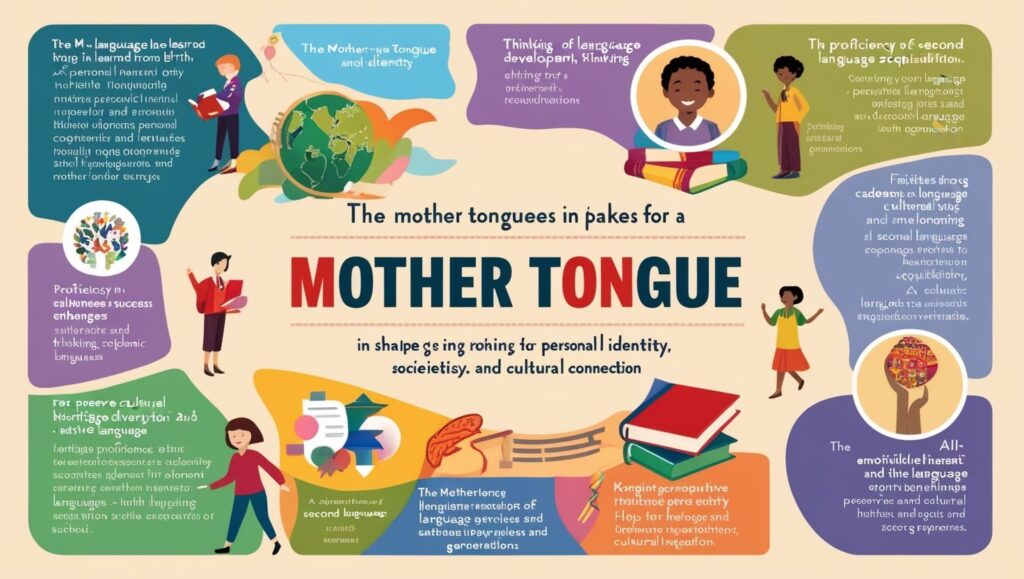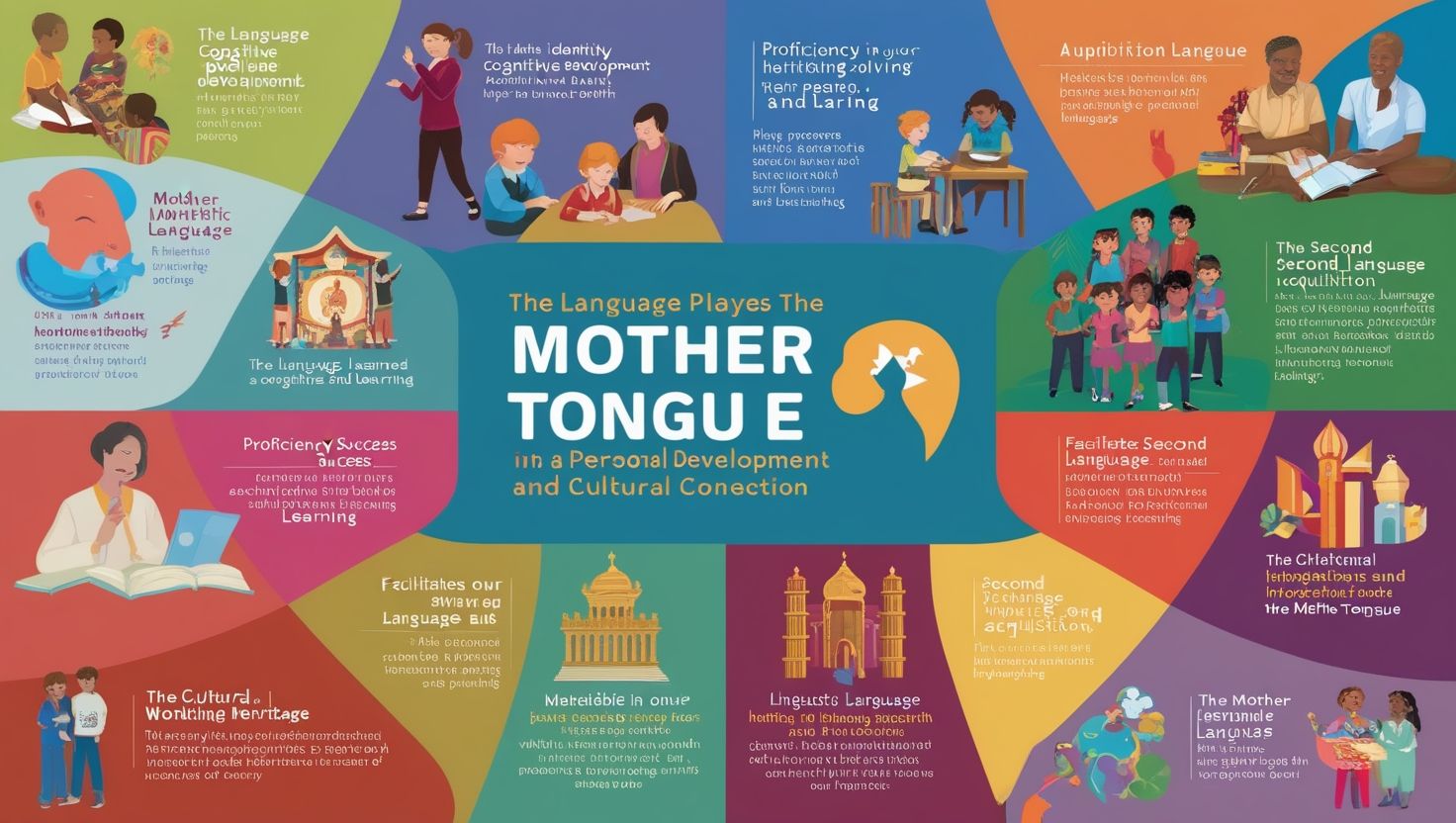The Significant Role of Mother Tongue, Language is more than a tool for communication; it is a key to cultural identity, personal growth, and cognitive development. At the core of this linguistic foundation lies the mother tongue, the language learned from birth or the primary language spoken in the household. This article explores the significant role of the mother tongue in shaping identity, fostering cognitive development, enhancing academic success, and preserving cultural heritage.
1. Foundation of Identity and Cultural Connection
The mother tongue plays a critical role in forming a person’s identity and connecting them to their cultural heritage. Language is one of the most potent expressions of culture, carrying within it the history, values, and traditions of a community. By speaking their mother tongue, individuals maintain a connection to their ancestry, family traditions, and societal values, reinforcing a sense of belonging.
The linguistic structures of a mother tongue reflect how a community interacts with the world. For example, some languages have specific terms for natural phenomena or cultural practices unique to their region, and such linguistic nuances often lost in translation. The intimate relationship between language and culture implies that when a person learns and communicates in their mother tongue, they are continuously engaging with their cultural heritage. It serves as a bridge to intergenerational knowledge transfer, ensuring that cultural customs, beliefs, and values preserved and passed down.
Additionally, identity is profoundly shaped by language. When people communicate in their mother tongue, they express themselves more freely and authentically. This expression helps in constructing personal and social identities, as language inherently linked to how individuals perceive themselves and are perceived by others. The mother tongue shapes one’s self-concept, fostering confidence in expressing ideas, emotions, and experiences.
2. Cognitive Development and Thinking Skills
The role of the mother tongue in cognitive development is critical, especially in early childhood. Children naturally learn to think in their first language, using it to interpret and understand the world around them. Mastery of the mother tongue at an early age lays the groundwork for the development of thinking skills, problem-solving abilities, and conceptual understanding.
Research has shown that children who are proficient in their mother tongue tend to develop stronger cognitive skills, such as memory, attention, and reasoning. These skills are fundamental not only for language acquisition but also for learning in general. When children build a solid foundation in their first language, they develop better critical thinking and creativity, as they can freely explore complex ideas in a language they fully understand.
A strong grasp of the mother tongue also positively impacts second-language acquisition. The skills learned in the mother tongue, such as vocabulary development, grammar, and syntax, can be transferred to learning other languages. This is known as cross-linguistic transfer. The better a child understands their first language, the more easily they can learn a second language. For example, a child fluent in their mother tongue often has an easier time picking up grammatical rules, sentence structures, and idiomatic expressions in other languages.
Furthermore, cognitive development through the mother tongue is linked to improved metalinguistic awareness—the ability to reflect on and manipulate language forms and structures. This awareness enhances a person’s capacity to learn additional languages and to perform better in subjects that require linguistic precision and abstract thinking, such as mathematics and science.
3. Academic Success and Educational Outcomes
The role of the mother tongue in academic success cannot be overstated. Numerous studies have shown that children who receive education in their mother tongue in the early years perform better academically than those who do not. Learning in a language they are familiar with allows students to grasp concepts more quickly and to focus on content rather than on deciphering an unfamiliar language.
In many countries, educational policies emphasize the use of the mother tongue in early childhood education as a means to improve learning outcomes. For instance, UNESCO advocates for mother-tongue-based multilingual education, recognizing that it enhances the learning process. When students are taught in their mother tongue, they are more likely to stay in school, achieve higher literacy rates, and develop a deeper understanding of subjects.
Students who are taught in a foreign language, particularly one they are not proficient in, face cognitive overload. They expend much of their mental energy trying to understand the language of instruction rather than focusing on the subject matter. This often leads to frustration, disengagement, and poor academic performance. On the contrary, education in the mother tongue fosters a more inclusive and equitable learning environment, where students feel comfortable, confident, and motivated to participate.
Moreover, mother-tongue education promotes the development of literacy skills. Reading and writing in the first language are more intuitive for children, as they are already familiar with its phonetics, vocabulary, and grammar. Literacy in the mother tongue becomes the foundation for acquiring literacy in other languages, promoting a lifelong love for learning and reading.

4. Preservation of Cultural Heritage and Linguistic Diversity
The decline in the use of mother tongues, particularly among minority groups, poses a significant threat to cultural diversity and heritage. When a language is lost, much of the knowledge, history, and cultural practices embedded in that language are lost as well. Language extinction is a global concern, with many indigenous languages at risk of disappearing.
Mother tongue plays a crucial role in preserving linguistic diversity and cultural heritage. By promoting the use of mother tongues, especially in formal education and community settings, societies can protect endangered languages and the cultural knowledge they contain. For example, indigenous languages often include unique understandings of biodiversity, ecological systems, and traditional medicine that are not easily translatable into dominant languages like English or Spanish.
Additionally, the mother tongue fosters intergenerational communication. In many cultures, elders pass down stories, customs, and wisdom orally in their native language. When younger generations lose proficiency in their mother tongue, they also lose the ability to engage with their cultural history and the knowledge that older generations possess.
Governments and educational institutions play a critical role in ensuring the survival of mother tongues through policies that promote multilingualism and language preservation. Celebrations like International Mother Language Day, held annually on February 21, highlight the importance of linguistic diversity and the need to protect and promote native languages worldwide.
5. Social Integration and Emotional Well-being
The mother tongue is not only vital for cognitive and academic success but also for emotional and social well-being. It provides a sense of security and emotional stability, particularly for children. When individuals can communicate in their mother tongue, they are better able to express their emotions, navigate relationships, and build social connections.
In multilingual settings, the use of one’s mother tongue can foster inclusivity and respect for linguistic diversity. It allows individuals to feel valued and recognized, promoting social cohesion and mutual understanding. For instance, in immigrant communities, allowing children to continue using their mother tongue alongside learning the dominant language of the host country helps them integrate more successfully into society while maintaining ties to their cultural roots.
Conversely, the suppression of the mother tongue can lead to feelings of alienation, loss of identity, and low self-esteem. Historical examples of forced language assimilation policies, such as those imposed on indigenous communities in North America and Australia, demonstrate the damaging effects of denying people the right to speak their native language. These policies led to the erosion of cultural identity and had long-term negative impacts on the psychological well-being of individuals.
6. The Role of Technology in Promoting Mother Tongue Usage
In today’s digital age, technology plays an essential role in promoting the use of mother tongues. With the rise of social media, mobile apps, and e-learning platforms, people can access content in their native language more easily than ever before. This helps bridge the gap for speakers of minority languages who may not have had access to educational materials or literature in their mother tongue.
For example, language preservation initiatives have harnessed digital platforms to record and archive endangered languages, making them available to future generations. Mobile applications designed to teach and promote mother tongues among young people have also gained popularity, encouraging multilingualism and language retention.
Moreover, global communication platforms like YouTube, podcasts, and blogs allow individuals to share stories, knowledge, and experiences in their native language, thus promoting linguistic diversity online. These technological advances are essential in ensuring that mother tongues continue to thrive in a rapidly globalizing world.
Conclusion
The mother tongue plays a multifaceted and indispensable role in shaping individuals, communities, and societies. From fostering cognitive development and academic success to preserving cultural heritage and promoting emotional well-being, the mother tongue is more than a mode of communication—it is the very fabric of personal and collective identity. As the world becomes increasingly interconnected, it is essential to recognize the value of mother tongues in maintaining linguistic diversity, cultural richness, and a sense of belonging across generations. Governments, educational institutions, and communities must continue to support the use of mother tongues, ensuring that future generations can benefit from the cognitive, social, and cultural advantages they provide.
References
- Cummins, J. (2001). “Bilingual Children’s Mother Tongue: Why Is It Important for Education?” Sprogforum, 7(19).
- UNESCO. (2003). Education in a Multilingual World. Paris: UNESCO.
- Skutnabb-Kangas, T. (2009). “Multilingual Education for Global Justice: Issues, Approaches, Opportunities.” International Review of Education, 55(5-6), 687-708.
- Heugh, K. (2011). “Theory and Practice – Language Education Models in Africa: Research, Design, Decision-making and Outcomes.” In Ouane, A., & Glanz, C. (Eds.), Optimising Learning, Education and Publishing in Africa: The Language Factor.

7 thoughts on “The Significant Role of Mother Tongue”
Comments are closed.